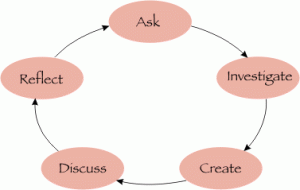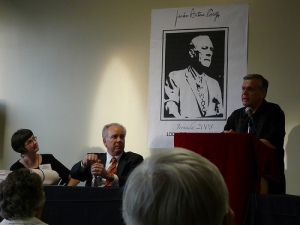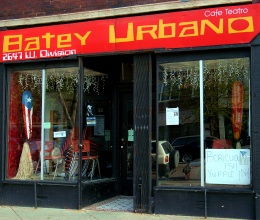In the
Youth Community Informatics Forum held June 27-28, 2008, about 40 young people and youth leaders came to Champaign from a variety of economically disadvantaged, mostly minority communities throughout the state.
There was a youth media festival on Friday. Then on Saturday, participants spent the morning working in one of four small groups to investigate "information spaces" in the community. These included the Center for Children's Books, Champaign Public Library, the Independent Media Center, Espresso Royale, Native House, Cafe Paradiso, Transit Plaza, Illini Union, and bronze plaques around campus. The group leader introduced a staff member from the center to the students for a small tour and helped them use a Flip video camera and a GPS receiver to record their observations.
At each site, the youth asked questions such as:
- What do we see in this information center? How do we like it?
- What is this center about?
- What do we want people to know about the center?
- How can we give others a clear idea about the center through watching/hearing our report?
In the afternoon, they created a Google map with their videos, text, and GPS coordinates. They also added music (an innovation we hadn't planned on, but perfectly appropriate). They then shared their findings in a public presentation.
The activity was conceived in terms of an Inquiry Cycle:

- Ask: What are the information spaces in the community?
- Investigate: Visit, listen, explore, video, determine geo-coordinates.
- Create: Make a GIS site with video, music, text.
- Discuss: Share the product and the findings with others.
- Reflect: Think about issues of journalism, democracy, careers, technologies, etc.
We found that the students learned technology skills, problem solving, cooperative work, writing, public presentation, specific information spaces, community journalism, university life, and much more.
Although the June activity made use of diverse new technologies, it is important to note that the focus was on learning about the community, asking questions, and sharing findings with others, not on the technologies per se. The most effective use of these technologies in libraries and similar settings would likely involve embedding that use in a larger, purposeful context. That context in turn could be a way to help connect youth with other resources, such as books and structured activities.
We're now planning a similar activity in October with the
Mortenson Center Associates, a group of visiting, international librarians. This will be the first day of a two- or three-day event. The longer time will allow for discussion about how the information spaces might differ in different countries, what technologies are available in different contexts, how valuable the activity would be for youth in their libraries, and so on. Students from the Community Informatics (LEEP) course would lead the investigation of the local-area information centers.
Both youth leaders and young people said they enjoyed the Forum, learned a lot, and hope for more. One youth leader said that next year he'd like to bring a much larger group. Another wrote,
I believe, in the not too distant future, that this conference will be seen as a landmark in developing a new perspective as part of the partnership between those marginalized sectors of civil society and the university in bridging the digital divide.
As Myles Horton might say, that's a long haul, but at least there was good spirit of cooperation in learning, which I hope will carry over to continuing work in these communities.
[Cross-posted on
Chip's Journey]
 The fifth annual Community as Intellectual Space Symposium will be held on June 12-14 at La Estancia on 2753 W. Division Street, Paseo Boricua, Chicago, Illinois.
The fifth annual Community as Intellectual Space Symposium will be held on June 12-14 at La Estancia on 2753 W. Division Street, Paseo Boricua, Chicago, Illinois. The keynote speaker this year is Antonia Darder, a Professor at the University of Illinois in Educational Policy Studies and Latino/a Studies. There will be presentations and workshops on
The keynote speaker this year is Antonia Darder, a Professor at the University of Illinois in Educational Policy Studies and Latino/a Studies. There will be presentations and workshops on